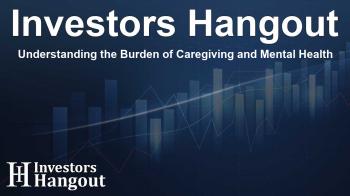Understanding the Burden of Caregiving and Mental Health

Understanding the Burden of Caregiving and Mental Health
A recent study involving over 12,500 assessments has brought to light some startling revelations about caregivers, particularly those who are part of the "Sandwich Generation"—people simultaneously caring for children and aging parents. The analysis shows a concerning trend: a significant portion of these caregivers exhibits high levels of stress, burnout, anxiety, and depression. These findings highlight a crucial need for support systems that address mental health issues faced by caregivers in a society where they often feel overwhelmed and under-resourced.
Key Insights from the Family Health Index
The Family Health Index (FHI) is an innovative tool designed to uncover the hidden health needs of employees and caregivers based on real-time data. Evidence from the FHI indicates that 64% of caregivers within the Sandwich Generation are screening positive for depression and anxiety symptoms. As families navigate complex caregiving roles, particularly those caring for children with special needs or aging parents, it is vital to recognize the emotional toll this can take.
Statistical Findings Highlighting Caregiver Challenges
Statistics speak volumes about the challenges faced by caregivers. Those caring for neurodivergent children exhibited the highest rates of burnout, with 65% reporting significant mental health challenges. Other groups included caregivers of individuals with chronic conditions at 61%, cancer care responsibilities at 55%, and those managing end-of-life situations at 57%. These statistics pave the way for much-needed interventions and support frameworks.
Impacts on Healthcare Cost and Employment
The implications of caregiver burnout extend beyond personal health. They contribute to heightened healthcare costs for employers and health plans, with estimates suggesting that engaged caregivers who receive valuable support can save companies significantly—$2,888, on average, per caregiver. As the aging population continues to rise, addressing caregivers' needs becomes increasingly critical, with a noticeable impact on overall healthcare expenses and workplace dynamics.
The Need for Proactive Support Systems
It's imperative for healthcare systems and employers to integrate proactive solutions for caregivers. The FHI's insights suggest that many caregivers struggle in isolation due to a lack of resources. By effectively addressing the mental health challenges of caregivers, organizations can positively influence their well-being, reduce absenteeism, and support better productivity levels in the workplace.
The Role of Organizations in Addressing Caregiver Needs
Many employers are beginning to recognize the toll that caregiving takes on their workforce, with studies indicating that a substantial percentage of family caregivers also hold jobs. When organizations proactively support their employees in caregiving roles, they can help mitigate the adverse effects of stress, absenteeism, and reduced workplace morale. As the caregiving crisis intensifies, establishing robust support structures could be transformative.
Improving Outcomes through Interventions
Effective interventions can dramatically change outcomes for caregivers. The FHI report highlights that 70% of caregivers at risk for burnout showed improvement in their well-being after receiving support, showcasing the efficacy of evidence-based interventions. These positive developments lead to reduced symptoms of anxiety and depression, enabling caregivers to allocate more time towards self-care and personal well-being.
Fostering a Supportive Community
Cleo emphasizes the importance of fostering a supportive community for caregivers. Increasing emotional wellness, enhancing connections with support systems, and ensuring caregivers feel valued are prime goals that can lead to healthier work-life balance. This holistic view of caregiving needs enables families to thrive despite the pressures they encounter.
Frequently Asked Questions
What are the main findings of the Family Health Index report?
The report reveals that 64% of caregivers within the Sandwich Generation screen positive for depression and anxiety, indicating a pressing need for mental health support.
Why is the Sandwich Generation particularly at risk?
This group, which balances responsibilities for children and aging parents, often experiences heightened levels of stress, leading to burnout and poor mental health.
How can organizations support caregivers?
Employers can provide resources such as mental health support, flexible work arrangements, and educational tools to help manage their responsibilities.
What is the economic impact of caregiver burnout?
Caregiver burnout contributes to increased healthcare costs for employers, with estimates suggesting up to $3.8 million in lost productivity per 1,000 employees annually.
Why is it important to address caregivers' needs?
Addressing caregivers' needs is crucial for reducing healthcare costs and improving employee morale and productivity, ultimately benefiting both individuals and organizations.
About The Author
Contact Dominic Sanders privately here. Or send an email with ATTN: Dominic Sanders as the subject to contact@investorshangout.com.
About Investors Hangout
Investors Hangout is a leading online stock forum for financial discussion and learning, offering a wide range of free tools and resources. It draws in traders of all levels, who exchange market knowledge, investigate trading tactics, and keep an eye on industry developments in real time. Featuring financial articles, stock message boards, quotes, charts, company profiles, and live news updates. Through cooperative learning and a wealth of informational resources, it helps users from novices creating their first portfolios to experts honing their techniques. Join Investors Hangout today: https://investorshangout.com/
The content of this article is based on factual, publicly available information and does not represent legal, financial, or investment advice. Investors Hangout does not offer financial advice, and the author is not a licensed financial advisor. Consult a qualified advisor before making any financial or investment decisions based on this article. This article should not be considered advice to purchase, sell, or hold any securities or other investments. If any of the material provided here is inaccurate, please contact us for corrections.

